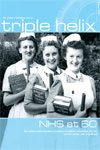Doctors reject 'admixed' embryos
A bmj.com poll carried out after Parliament had voted in the HFE Bill to create so-called 'admixed' embryos for research showed an almost two thirds majority of doctors were opposed to it. 747 votes were cast and 478 (64%) were against and 269 (36%) for. Eutychus was encouraged, but the poll was only shutting the stable door after the chimera had bolted. (BMJ 2008; 336:1266)
Let no debt remain outstanding
The BMA predicts that massive debts on graduation of more than £60,000 will deter would-be medical students and discourage diversity within the profession. If the government raises the £3,000 cap on tuition fees to £7,000 when it reviews the system in 2009 then graduate debt could triple to £67,000 for those from London (graduates elsewhere owing about £57,000). BMA Medical Student Committee chairman Ian Noble said 'Becoming a doctor must not become the preserve of the wealthy'. Our sister organisation in the USA helps student members out with debt to free some for missionary service. Maybe that will come here? (BMA News 2008; 7June: 1)
More blessed to give than to receive
Economists are reported to have been surprised by recent research showing money makes you happy – but only if you give it away. Experimental groups of students received windfalls of cash to spend either on themselves or on others, and the latter group demonstrated the truth of Paul's report in Acts 20:35 of the teaching of Jesus. (Science 2008; 319:1687-8)
Apocalypse now?
Eutychus cannot imagine how accurately such things can be calculated, but according to the US Census Bureau the world's 6,666,666,666th person was born on 10 May. Such apocalyptic numbers inevitably stimulated the always heated population debate, with one side lamenting that we have long ago passed our sustainability, while the Population Research Institute claimed that the number represented 'a great victory over early death won by advances in health, nutrition and longevity' and celebrated 'the birth of this milestone baby'. (Population Research Institute Weekly Briefing 19 May 2008)
Sex, lies and educational aspirations
On his recent visit to the USA, Pope Benedict XVI told Catholic educators 'We observe today…an aimless pursuit of novelty parading as the realisation of freedom…We witness an assumption that every experience is of equal worth…And particularly disturbing, is the reduction of the precious and delicate education in sexuality to management of 'risk', bereft of any reference to the beauty of conjugal love'. Commenting on the global significance of this address, PRI commended the Papal condemnation of what they call the current 'sexual culture of lies, misrepresentations and illusions'. (Population Research Institute Weekly Briefing 29 April 2008)
Betting on death
The late Professor David Short used to say that medical prognosis was a bit like weather forecasting in Britain: often right but sometimes hopelessly wrong. 58-year-old Jon Matthews from Milton Keynes seems to have agreed. He has mesothelioma and his doctor's prognosis in April 2006 was that he would be dead within nine months, so he bet £100 at William Hill's he would be alive on 1 June 2008. They gave him 50-1 odds and he collected £5,000. He will give half to the Macmillan cancer charity and spend half on himself, on 'booze and fags probably'. (news.bbc.co.uk
Looking for loopholes
On the same theme of quirky behaviour by the terminally ill, Emyr Gravell introduces a reflective piece on the art of general practice with a story about the 'hard-drinking, misanthropic comedian' WC Fields. A friend called to see him when he was dying and was surprised to find him intently absorbed in the Bible. Enquiring whether he was seeing the error of his ways, Fields corrected him by explaining 'I'm just looking for the loopholes'. (BJGP 2008; June: 450)
Pie in the sky when you die?
Presenting research on the relationship of religion and happiness to a Royal Economic Society conference, Professor Andrew Clark of the Paris School of Economics said 'What we found was that religious people were experiencing current day rewards, rather than storing them up for the future'. Data from thousands of Europeans revealed higher levels of 'life satisfaction' in believers (both Catholic and Protestant) and that they were better able to cope with shocks such as losing a job or divorce. (news.bbc.co.uk
More medical killing
Doctors in the Netherlands reported more cases of euthanasia and assisted suicide in 2007. The figures rose by 10% over 2006 to 2,120. Three cases were judged to have failed the legal requirements. Meanwhile, in Scotland, the number of abortions in 2007 was the highest ever at 13,703, up from 13,163 in 2006. 372 abortions were performed on girls under 16. There were 57,781 births, meaning that about one in five pregnancies in Scotland ends in abortion. (BMJ 2008; 336:1094 and news.scotsman.com
Where there is no vision
Scripture continues to appear in the medical journals, but now in visual form too. The BMJ chose as its 'Picture of the Week' for 29 March a page from a calendar produced by Alma Swan to promote the open access publishing model. The page for July quotes Proverbs 29:18 in the traditional version: 'Where there is no vision the people perish', and is illustrated in what Eutychus would call an 'interesting' way. (BMJ 2008; 336: This week)































